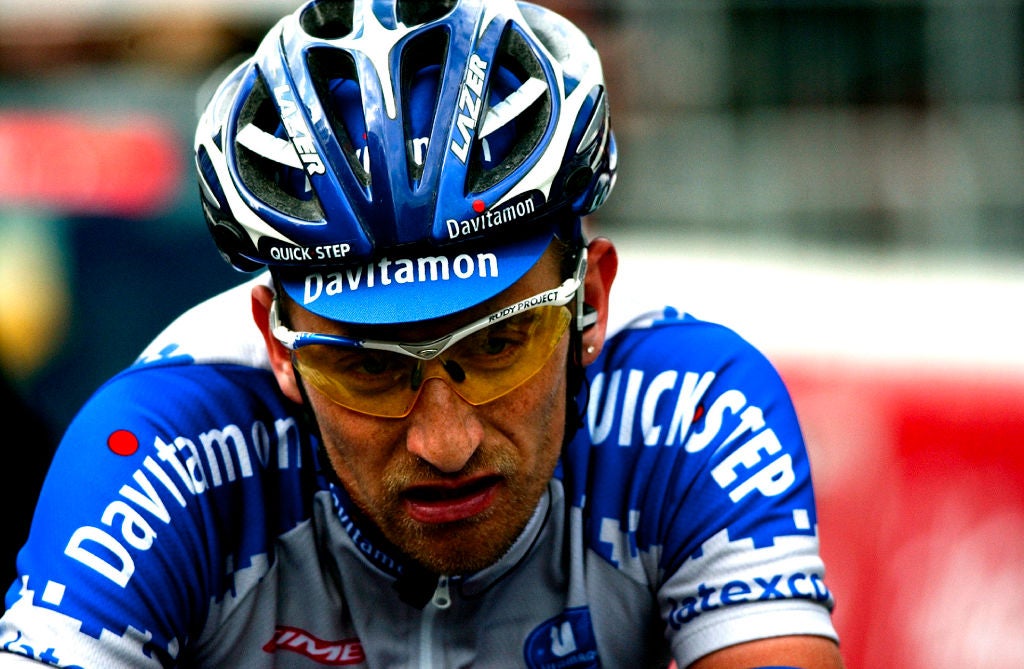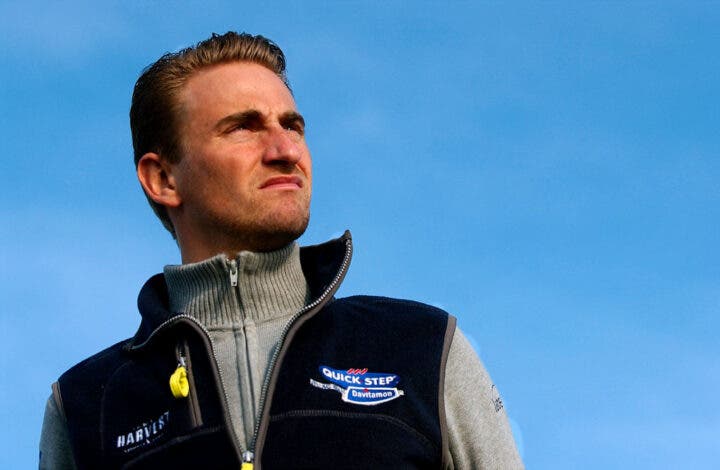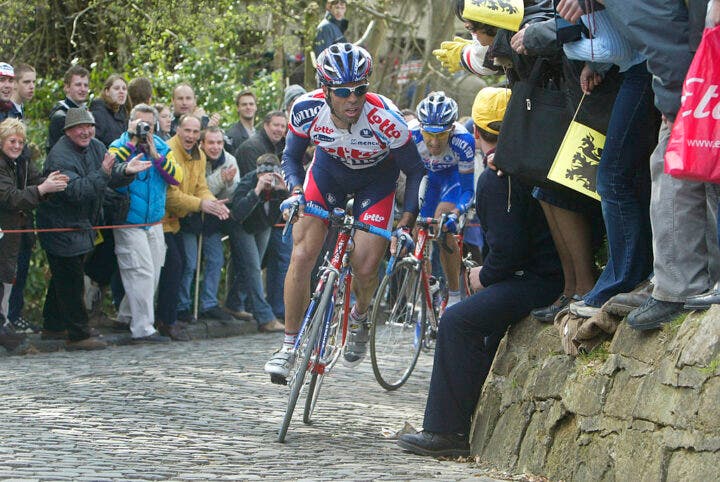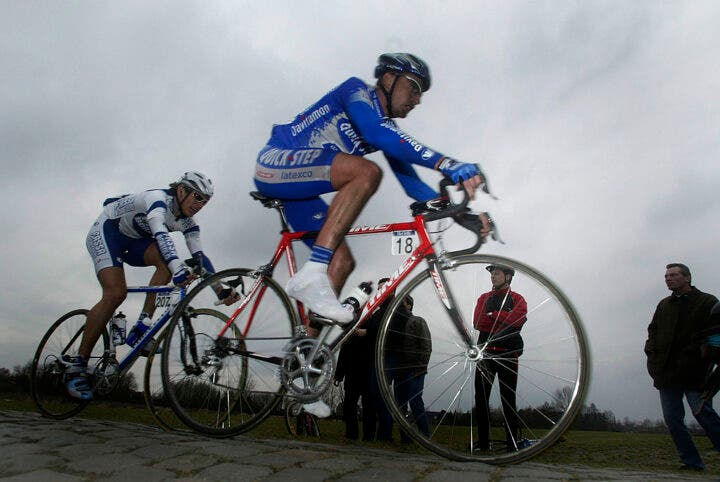'The Rise & Fall of Frank Vandenbroucke': Peter Van Petegem and the Tour of Flanders controversy

Frank Vandenbroucke was a cycling rockstar. The Belgian raced fast, claiming some of the spring’s biggest classics, and he lived faster.
A rich palmarès including Liège-Bastogne-Liège and Paris-Nice and steely souplesse made Vandenbroucke the brightest star of pro cycling in the turn of this century.
But team spats, a party lifestyle, and a tendency to self-distruct saw a dramatic fall from grace and a tragic end for the rider Belgium branded “God.”
Also read: Commentary: Vandenbroucke was cycling’s up-and-down man
In an extract from author and VeloNews contributor Andy McGrath’s book God is Dead: The Rise & Fall of Frank Vandenbroucke, Cycling’s Great Wasted Talent, we take a look at one of the most controversial incidents in a life riddled with drama.
The scene is spring 2003, and Vandenbroucke is riding with Patrick Lefevere’s newly-formed Quick-Step team.
With Johan Museeuw and Tom Boonen both falling sick in the lead-up to the Tour of Flanders, Vandenbroucke is left shouldering the burden of team leadership in the biggest classic of the season ahead of a showdown with archrival Peter van Petegem.

From the pages of God is Dead: The Rise & Fall of Frank Vandenbroucke, Cycling’s Great Wasted Talent
There was one last opportunity for ambush: the Bosberg. Vandenbroucke accelerated out of Van Petegem’s slipstream at its steepest part and pulled out a couple of lengths, but his rival was on to him quickly. From there, they continued to take turns doing the work. The Quick Step car blasted up, klaxon blaring, 5km from the finish and lingered for several seconds. It transpired later that Lefevere had again told Vandenbroucke not to collaborate with Van Petegem, the faster finisher and apparent stronger man. Yet Vandenbroucke disregarded the instructions until refusing to budge from his rival’s back wheel during the last 1,500 metres. He had done too much work, but it arguably made little difference to the outcome. He launched his sprint with more than 300 metres to go on the slightly uphill finish, the suicidal, desperate act of a man who knew his fate. He hardly got his front wheel ahead before Van Petegem countered and pulled away. As his rival celebrated, a full ten bike lengths in front, Vandenbroucke looked down, shook his head and threw up an open-palmed hand as if to ask what more he could have done.
Though happy to see his troubled charge in the ascendancy, Lefevere rued the result post-race, suggesting they had offered victory to Van Petegem on a plate. Nowadays, he is more sanguine: ‘Afterwards I realized he could not beat him. But of course, it’s a game, winning, losing. It was like Yves Lampaert [a racer with a poor sprint finish] taking a ride with [sprinter Elia] Viviani.’ Vandenbroucke was described by national broadcasters VRT as the day’s moral victor, the result carrying rich promise of a return to his 1999 vintage – especially as, unbeknownst to them, it was achieved more on innate class than a bedrock of winter work. Second place was a sporting resurrection not quite worthy of Lazarus, but given his turbulent history, still remarkable. Yet, on the podium, Vandenbroucke’s body language spoke volumes: he only cracked a smile when it came to spraying a bottle of champagne, then nodded to someone out of shot, anxious to check that the ceremony was over so that he could get off the stage as quickly as possible.
It was not the fairytale comeback that it appeared to be. After watching the race finish, psychologist Jef Brouwers got in his car and drove to the team’s accommodation, the Kennedy Hotel in Ghent. ‘I knew second place was a disaster. He was not strong enough at that moment to accept it. Not possible,’ he says. That evening, Brouwers spent three hours with Frank and Sarah, the beaten cyclist perched on the side of the bath, staring into space and silent for long stretches of time. ‘I can still see him now. He was completely broken,’ Brouwers says. ‘He was sure he was the best in the race. But he was not,’ Brouwers adds, with a little laugh. ‘If he was better than Van Petegem, he would have won. So the fact that he did not win, in his mind he was not as good as he thought he was.’

The plot thickened further in the following days when a Lotto-Domo rider claimed that Frank had been paid 7 million Belgian francs (€175,000) by Van Petegem and had not shared the money with the Quick Step team-mates who had worked for him, as is customary. ‘Somebody launched this rumour and the riders believed it. It was a bad thing. Frank always denied it,’ Patrick Lefevere says. ‘And the trust from the team was gone.’ Does Lefevere believe it? ‘I hate rumours,’ he bats back. Does he think it’s the truth, then? ‘We will never know. He took it to his grave and Van Petegem never speaks. He didn’t speak about it before.’
Hypothetically, why would Van Petegem have paid him? It was insurance to ensure his continued collaboration and remove the slim possibility of Vandenbroucke beating him at the finish, in the knowledge he could recoup far greater sums of money from endorsements, bonuses or a new contract. Vandenbroucke could have assented, acknowledging his own fatigue and the reality that such an agreement would mean an assured second place rather than tactical disharmony and risking the return of the nine chasers. Another relevant question is when they would have discussed the terms. In 15km from the top of the Muur to the finish, the duo appeared to exchange words at least three times, but the longest amount of time in discussion was three seconds. (Of course, such collusion is not meant to be noticeable, given such behaviour is forbidden by the UCI.)
Although cycling’s biggest races are not immune to trading, this was no one-horse town kermesse but Vandenbroucke’s favourite event, one he’d watched on the roadside as a child. Vandenbroucke even had dreams of winning the Ronde van Vlaanderen; in those sequences, the crowd in Flanders was double the usual size and everyone was shouting his name. No wonder he angrily denied the claims.
‘His job was winning. His job was showing the world, to be loved. Not being the best. No, to be loved,’ Brouwers says. ‘So he had a need for that applause. And he got applause for his second place but he hated that. He didn’t want that, it’s a pity applause – an appreciation for the rider but not for the champion . . . the only place that mattered for him was first. So, being second was worse than a DNF! It’s failure and, next to that, the need to be loved with a victory.’ Brouwers smiles and shakes his head. ‘He would never have sold the Ronde van Vlaanderen in that mindset.’
Vandenbroucke’s crestfallen reaction in the privacy of his hotel room supports that theory. ‘He could not cope with it. He wanted to win but he couldn’t. And at that moment, that was a bit [like] the end . . . my idea was that if he had won that race, it would have been another life.’

God is Dead: The Rise & Fall of Frank Vandenbroucke, Cycling’s Great Wasted Talent by Andy McGrath is available now on a range of formats.